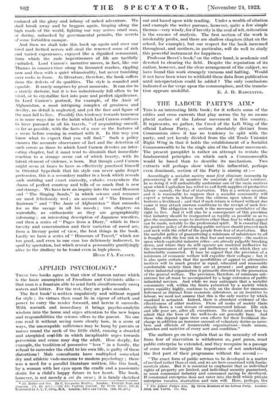APPLIED PSYCHOLOGY.*
THESE two books agree in that view of human nature which is the basic assumption of Freudians and Calvinists alike— that man is a fountain able to send forth simultaneously sweet waters and bitter. For the rest, they are poles asunder.
The first books is written impulsively and without regard for style ; its virtues then must lie in vigour of attack and power to carry the reader forward, and herein it succeeds. With warmth and immediacy it brings psycho-analytic wisdom into the home and urges attention to the new hopes and responsibilities the science offers to the parent. No one can read it without seeing more clearly how, in a score of ways, the unescapable millstones may be hung by parents or nurses round the neck of the little child, causing a dwarfed and atrophied soil-life in which inexplicable urges towards perversion and crime may dog the adult. How deeply, for example, the tradition of possessive " love " in a family, the refusal to surrender the child to his own life, is guilty of these distortions I Male consultants have multiplied somewhat dry and athletic vade-mecums to modern psychology ; there was a need for a parallel literature written, like this book, by a woman with her eyes upon the cradle and a passionate desire for a child's happy future in her heart. The book, however, is not merely a cri du cceur ; it is firmly sketched • (1) Mother and Son. By C. Gasquolno Hartley. London : Eveleigh Nash and Grayson. ris. 6d. net.I—(2) The Fighting Instinct. By Pierre Buret, Litt.D. Translated by J. Y. 1, Gregg, MA. London ; Allen and tinain. llOs. Od. bet.1
out and based upon wide reading. Under a wealth of citation and example the writer pursues, however, quite a few simple themes—very wisely, for if brevity is the soul of wit, reiteration is the essence of analysis. The first section of the work is intolerably prolix, and there are shallow chapters (that on the school, for example), but our respect for the book increased throughout, and mothers, in particular, will do well to study this powerful instrument for happiness.
Professor Bovet's book,2 on the other hand, is academic and devoted to clearing the field. Despite the reputation of its author, however, and the clear arrangement of the subject, we have found this work strangely vacuous and halting. Would it not have been wiser to withhold these data from publication until interpretation could be added ? The only conclusions indicated so far verge upon the commonplace, and the transla-


















































 Previous page
Previous page